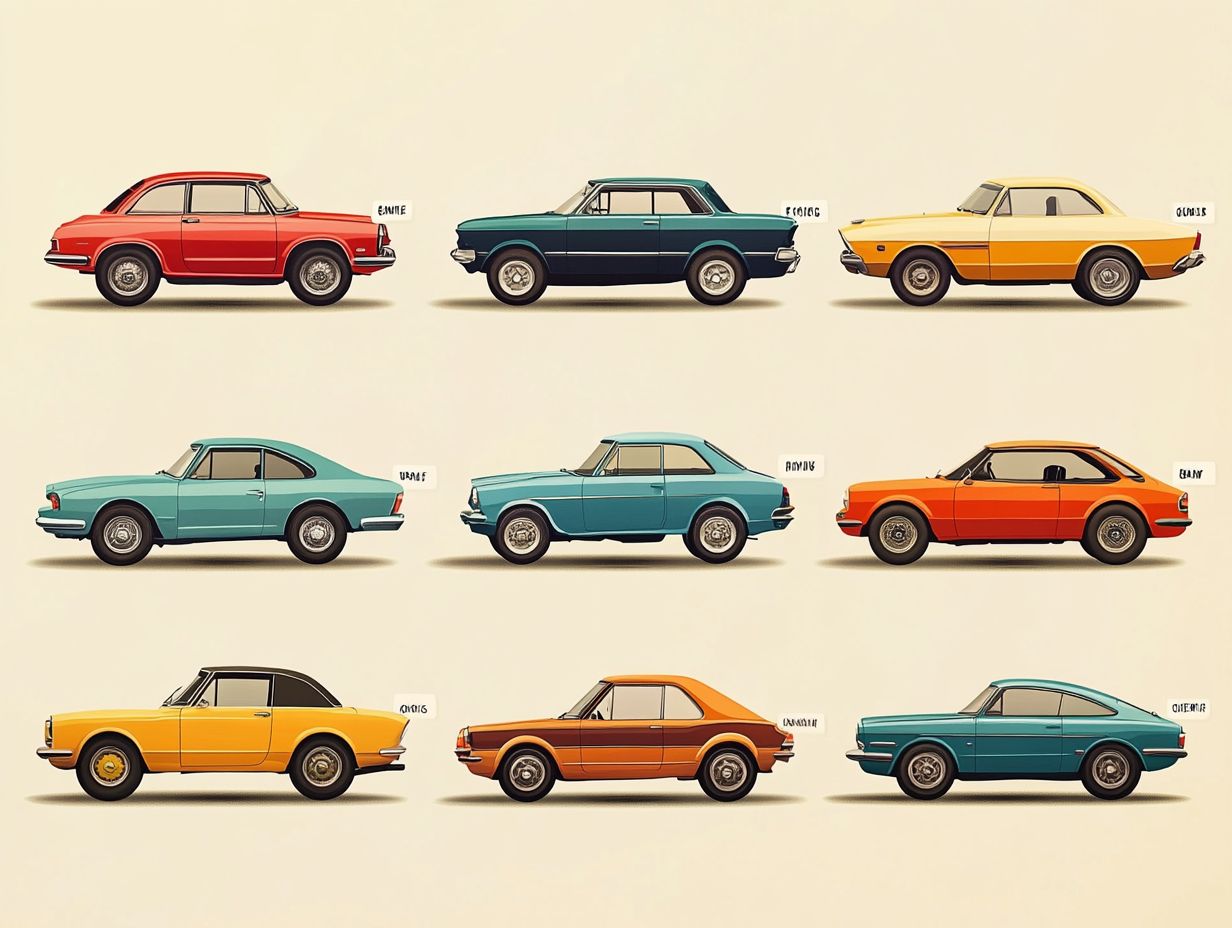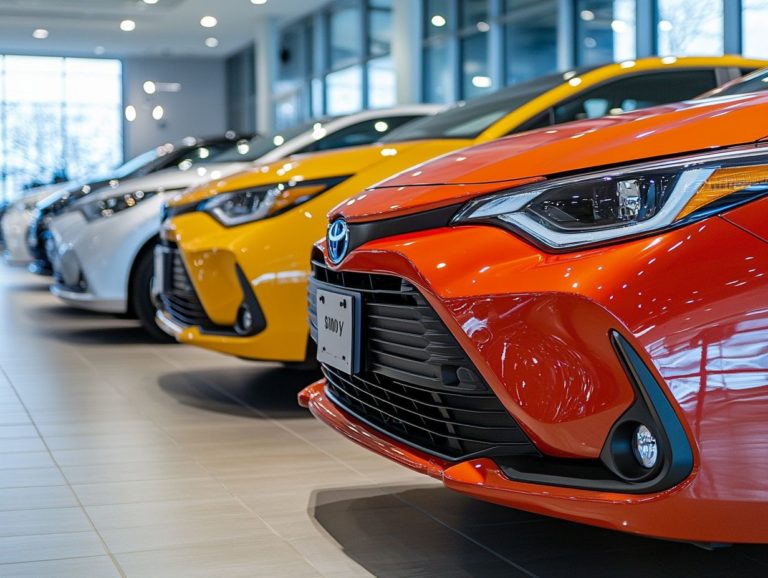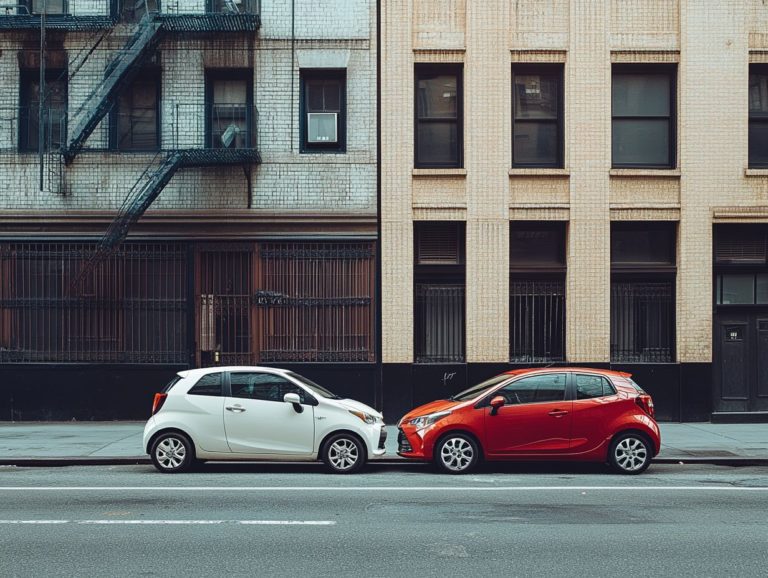Top 10 Cars with the Lowest Maintenance Costs
When choosing a vehicle, one of the most critical factors to consider is maintenance costs. Opting for a reliable car that is easy on your wallet can save you both time and money in the long run.
In this guide, you ll discover the top 10 cars with the lowest maintenance costs, featuring well-known models like the Toyota Corolla and Honda Civic. We ll also delve into important considerations, including common maintenance issues, best practices for upkeep, and essential tips for selecting a low-maintenance vehicle.
Whether you re a first-time buyer or contemplating a switch, this guide is here to help you make a smart choice!
Contents
- Key Takeaways:
- 1. Toyota Corolla
- 2. Honda Civic
- 3. Ford Focus
- 4. Kia Soul
- 5. Mazda3
- 6. Hyundai Elantra
- 7. Chevrolet Cruze
- 8. Subaru Impreza
- 9. Nissan Sentra
- 10. Volkswagen Jetta
- What Factors Contribute to Low Maintenance Costs in a Car?
- What Are the Most Common Maintenance Issues in Cars?
- How Can Proper Maintenance Save Money in the Long Run?
- Ready to Keep Your Car Running Smoothly? Here Are the Best Maintenance Tips!
- How Can a Car Owner Determine the Maintenance Costs of a Car?
- Want to pick a low-maintenance car? Let s explore some key tips!
- Frequently Asked Questions
- 1. What are the top 10 cars with the lowest maintenance costs?
- 2. How were these cars selected for the list of top 10 lowest maintenance costs?
- 3. Are these cars only affordable for purchase or also for maintenance?
- 4. How do I ensure that my car’s maintenance costs remain low?
- 5. Are there any other factors besides maintenance costs to consider when buying a car?
- 6. Can I expect the same low maintenance costs for these cars in the future?
Key Takeaways:

- Toyota Corolla, Honda Civic, and Ford Focus are among the top 3 cars with the lowest maintenance costs, making them a cost-effective choice for car owners.
- Keep your car well-maintained to save big bucks on repairs and prolong its lifespan.
- When choosing a car with low maintenance costs, consider reliability, fuel efficiency, and the availability of affordable parts.
1. Toyota Corolla
The Toyota Corolla has earned its reputation as one of the most affordable cars on the market. It delivers exceptional reliability and low maintenance costs, making it a smart choice for those seeking long-term value.
This stellar reputation is echoed by countless owners who rave about its ability to run smoothly for over a decade with minimal repairs. When compared to competitors like Honda and Hyundai, the Corolla truly shines in terms of affordability, with average yearly maintenance costs around $400 considerably lower than many alternatives.
Whether you re tackling routine oil changes or brake replacements, maintaining your Corolla remains budget-friendly. Toyota s dedication to high-quality parts and services ensures that your vehicle retains its value, leading to overall lower ownership costs. Many drivers find peace of mind knowing they ve made a wise investment.
2. Honda Civic
The Honda Civic consistently ranks among the most economical cars to own, thanks to its strong design and low maintenance costs. This makes it a favored choice for those who value durability and reliability.
Routine oil changes average around $50 to $70, and tire rotations typically cost between $20 and $50. You’ll find that maintenance costs for the Civic remain impressively manageable.
Civics hold a slight advantage in long-term sustainability due to their reputation for being long-lasting and resilient. As an owner, you ll likely discover that you spend less over the years, especially since the Civic can easily surpass 200,000 miles with proper care. This appealing ownership experience significantly contributes to its enduring popularity within the compact car market.
3. Ford Focus
The Ford Focus emerges as one of the most affordable options in its class, delivering an enticing blend of cost-effectiveness and manageable maintenance expenses, as highlighted by numerous automotive expert surveys.
These surveys show that owning a Focus can significantly reduce your costs compared to competitors like Chevrolet and Volkswagen. With its strategic pricing, you ll likely find that the Focus aligns with your budget while promising ongoing savings.
Owners consistently express satisfaction with the vehicle s reliability and economical upkeep. Consumer reports frequently praise the Focus for its impressive fuel efficiency and low repair costs, making it an attractive choice for those who are cost-conscious yet seek quality and performance.
4. Kia Soul
The Kia Soul stands out for its distinctive design and affordability, often landing on the lists of least expensive cars. Its impressively low maintenance costs only add to its allure for those seeking affordable transportation.
What truly sets this vehicle apart are its innovative features, providing a fun driving experience without the financial strain. When you compare it to rivals like Hyundai and Nissan, you ll discover that the Soul generally incurs lower repair costs, making it even more attractive.
Maintenance tasks for the Soul, such as oil changes and brake pad replacements, are typically simple and cost-effective. This reliability not only keeps your expenses in check but also ensures a hassle-free ownership experience.
Don t miss out on the Kia Soul a smart choice for anyone seeking style and practicality in their vehicle.
5. Mazda3
The Mazda3 frequently emerges as one of the most economical cars to maintain, thanks to its efficient design that significantly lowers maintenance costs a factor that undoubtedly appeals to buyers like you who prioritize value in car ownership.
This commitment to being affordable goes beyond just routine servicing, giving the Mazda3 a competitive edge over rivals like Subaru and Honda. While Subaru impresses with its robust performance across varied terrains and Honda shines in terms of reliability, the long-term ownership costs of these brands reveal different strengths.
Mazda strikes a remarkable balance between performance and cost-effectiveness, allowing you to relish an engaging driving experience without the burdensome long-term expenses that often come with other models. When you consider overall value, the Mazda3 is a wise choice for anyone seeking both performance and cost efficiency on their automotive journey.
6. Hyundai Elantra

The Hyundai Elantra often stands out as one of the most budget-friendly cars on the market, thanks to its competitive pricing and low maintenance costs. This makes it a particularly appealing choice for those who are mindful of their finances, as highlighted in various consumer reports.
This affordability stems from its solid engineering and the easy availability of parts, which help keep routine service costs manageable. For instance, the timing belt, which helps control the engine’s timing, can last up to 100,000 miles, meaning you ll spend less on replacements and, importantly, save on labor costs as well. Oil changes and brake replacements are typically cheaper than those for competitors like Toyota and Kia.
Many drivers rave about their ownership experience with the Elantra. It excels in upfront costs and has a strong reputation for reliability and efficiency, ultimately leading to reduced expenses over time compared to other vehicles in its class.
7. Chevrolet Cruze
The Chevrolet Cruze stands out as a highly favorable option among budget-friendly vehicles, renowned for its economical maintenance costs and reliable performance that resonate with a diverse array of car owners.
When you evaluate the Cruze s maintenance expenses against competitors like Ford and Nissan, you ll often find it holds a significant edge. For example, routine repairs think oil changes, brake replacements, and tire rotations tend to be more wallet-friendly with the Cruze. In contrast, Ford vehicles may lead to higher expenses, especially concerning parts, while Nissan often presents a mixed bag of moderate costs yet can struggle with the frequency of certain repairs.
Considering the overall ownership costs encompassing insurance, fuel, and potential repairs the Cruze positions itself as an economically savvy choice, making it particularly attractive for those mindful of their budget.
8. Subaru Impreza
The Subaru Impreza is frequently hailed as one of the most affordable cars on the market. It expertly blends four-wheel drive with manageable maintenance costs, making it a reliable choice for those navigating various driving conditions.
Its four-wheel drive system not only delivers exceptional traction and stability on slippery roads but also helps keep your long-term ownership expenses in check by minimizing tire wear. In comparison to other brands like Mazda and Honda, which may not offer the same level of all-weather performance, the Impreza truly distinguishes itself as a wise, cost-effective choice.
Many drivers find that even with added features, the Impreza remains budget-friendly. This allows you to enjoy reliability and versatility without straining your finances. This perfect marriage of functionality and affordability makes the Impreza an enticing option for a broad audience.
9. Nissan Sentra
The Nissan Sentra stands out as one of the most economical cars to maintain thanks to its reliable performance and low maintenance costs. This provides peace of mind especially if you have an extended car warranty, which covers repairs beyond the standard warranty.
With impressive fuel efficiency and a straightforward design, this compact sedan reduces the need for frequent repairs and services. The competitive warranty packages available for the Sentra add an extra layer of financial security, covering many common issues that may arise during ownership.
When compared to rivals like Toyota and Hyundai, the Sentra often proves to be the more cost-effective choice. It offers similar features and reliability without breaking the bank. For budget-conscious drivers, these qualities make the Sentra an appealing option, ensuring not just the upkeep of your vehicle but also the health of your finances.
10. Volkswagen Jetta
The Volkswagen Jetta is a strong contender among the most affordable cars, seamlessly combining performance with low maintenance costs. This makes it particularly appealing to those who prioritize quality and durability.
When you compare maintenance expenses, the Jetta often proves to be a more budget-friendly choice than other German brands like BMW and Audi. This advantage becomes clear when you look at routine service costs, such as oil changes and brake replacements, where Jetta owners typically enjoy more wallet-friendly pricing.
While premium brands might charge a premium for parts and labor, the Jetta benefits from a broader availability of parts and a less intricate engineering design. The comprehensive warranty options offered by Volkswagen can significantly cushion the financial impact of repairs, making the Jetta a compelling choice for anyone seeking a reliable vehicle without the hefty price tag usually associated with luxury models.
What Factors Contribute to Low Maintenance Costs in a Car?
Several factors play a crucial role in keeping your car’s maintenance costs low, including brand differences, vehicle design, and the frequency of essential repairs. All these elements ultimately shape your car ownership expenses over time.
Brands like Honda, Toyota, and Hyundai have made significant strides in crafting vehicles that not only excel in performance but also demand less upkeep. These manufacturers often employ durable materials and smart design strategies that simplify common repairs and reduce their frequency. This thoughtful approach not only enhances your driving experience but also substantially decreases the long-term maintenance costs you can expect.
By choosing such vehicles, you’re not merely considering the initial purchase price; you’re making savvy decisions about your future expenses. This foresight improves your financial planning and ensures a more sustainable ownership experience overall. Explore these options today to enjoy peace of mind on the road!
What Are the Most Common Maintenance Issues in Cars?

Common maintenance issues in cars typically revolve around essential services like oil changes and tire rotations. These services are crucial for ensuring your vehicle performs at its best and enjoys a longer lifespan.
As a car owner, you might frequently encounter tasks such as brake pad replacements, battery inspections, and checking the levels of various fluids in the car. Each of these areas requires your regular attention to prevent more significant problems from arising later on.
For instance, studies show that an oil change generally costs between $30 and $100, while a tire rotation might set you back around $20 to $50. Keep in mind that these costs can fluctuate depending on your vehicle’s make and model Ford owners often face slightly higher service fees compared to those with Chevrolet and Nissan vehicles.
Interestingly, data reveals that Chevrolet models may need brake pad replacements more frequently, averaging every 30,000 miles, whereas Nissan vehicles are celebrated for their durability, typically requiring this service around every 50,000 miles. Knowing these details helps you budget better for maintenance.
How Can Proper Maintenance Save Money in the Long Run?
Taking care of your car saves you money over time. Regular upkeep not only prevents expensive repairs but also extends the overall lifespan of your vehicle, significantly impacting ownership costs.
By dedicating time and resources to practices like timely oil changes and routine tire rotations, you can enjoy smoother rides and improved fuel efficiency. Neglecting these tasks might lead to severe engine damage or premature tire wear, resulting in replacement costs that can easily surpass what you would spend on proactive maintenance.
In essence, while some might perceive scheduled services as mere expenses, a more analytical perspective reveals them as crucial investments that shield you from unexpected financial burdens and ensure the longevity and reliability of your vehicle.
Ready to Keep Your Car Running Smoothly? Here Are the Best Maintenance Tips!
Adopting best practices for maintaining your car can significantly lower your maintenance costs and enhance your vehicle’s longevity, crafting a more enjoyable ownership experience.
Always follow the manufacturer’s guidelines. They tell you exactly when and what services your car needs. Choosing quality parts over generic substitutes ensures reliability and compatibility, which can lead to fewer repairs in the long run.
Keep detailed records of all maintenance. This not only helps you track your services but can also boost your car’s resale value. You must recognize that these best practices can differ by brand; for example, Toyota owners might prioritize regular oil changes and transmission services, while Honda drivers often focus on timing belt replacements.
If you re a Volkswagen enthusiast, paying attention to scheduled inspections is vital due to the brand’s complexity. This highlights how tailored approaches for different makes can lead to optimal performance, ensuring your car runs smoothly for years to come.
How Can a Car Owner Determine the Maintenance Costs of a Car?
You can determine the maintenance costs of your vehicle by consulting resources such as auto surveys and consumer reports, which provide valuable insights into expected expenses for various brands.
By carefully analyzing these reports, you ll not only gain clarity on the upfront costs but also uncover the long-term financial implications of owning vehicles like Ford, Kia, and Hyundai. These comparisons give you the power in your hands to understand which brands typically come with lower repair costs and highlight any models that might be prone to frequent issues. Consequently, you can make informed decisions about your purchase, considering factors such as warranty coverage and the availability of parts, which can significantly impact your overall expenses.
This data-driven approach ensures that your car ownership experience remains both manageable and economical.
Want to pick a low-maintenance car? Let s explore some key tips!
Choosing a low-maintenance car requires careful consideration of several key factors, such as the vehicle’s dependability, brand differences, and projected ownership costs over time.
You should prioritize models from manufacturers known for their low upkeep. Brands like Honda, Toyota, and Subaru frequently emerge at the top for their affordability. They provide a diverse array of options tailored to various preferences, from sleek sedans to versatile SUVs.
By looking into online reviews and forums, you can glean valuable insights from the real-world experiences of other owners. Engaging in thorough research gives you the power to identify any common issues tied to specific models. This can guide you toward more informed choices and, ultimately, a more rewarding driving experience.
Frequently Asked Questions
1. What are the top 10 cars with the lowest maintenance costs?

- Honda Fit
- Toyota Corolla
- Subaru Impreza
- Mazda3
- Kia Soul
- Hyundai Elantra
- Volkswagen Jetta
- Nissan Versa
- Chevrolet Spark
- Ford Focus
According to our reference data, these are the top 10 cars with the lowest maintenance costs.
2. How were these cars selected for the list of top 10 lowest maintenance costs?
We used data from reliable sources such as Consumer Reports and Edmunds to compile a list of the most reliable and affordable cars in terms of maintenance costs. These cars have consistently shown low maintenance costs over the years.
3. Are these cars only affordable for purchase or also for maintenance?
These cars are not only affordable to purchase but also have low maintenance costs, making them a wise long-term investment. They have low repair costs and require less frequent servicing.
4. How do I ensure that my car’s maintenance costs remain low?
Regular maintenance and timely repairs are key to keeping your car’s maintenance costs low. Following the manufacturer’s recommended maintenance schedule can help prevent bigger and more expensive problems down the road.
5. Are there any other factors besides maintenance costs to consider when buying a car?
Yes, while maintenance costs are important, it’s also essential to consider the car’s overall reliability, safety ratings, fuel efficiency, and resale value. These factors can also affect the long-term cost of owning a car.
6. Can I expect the same low maintenance costs for these cars in the future?
While the cars on this list have shown consistently low maintenance costs, individual experiences may vary. Regular maintenance and proper care can help keep maintenance costs low, but unforeseen issues may still arise. We recommend doing thorough research and considering all factors before making a car purchase.
Ready to find your perfect low-maintenance car?





